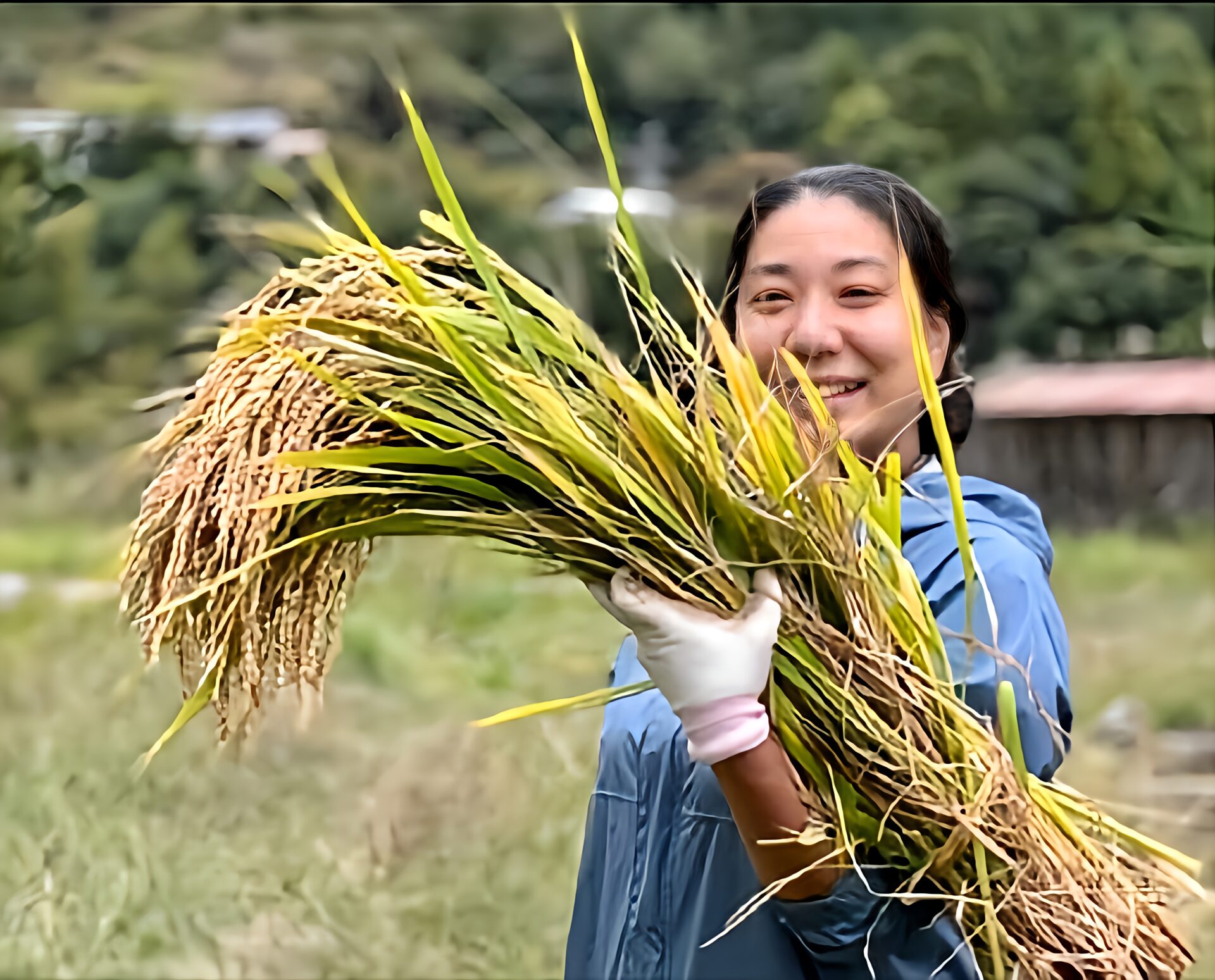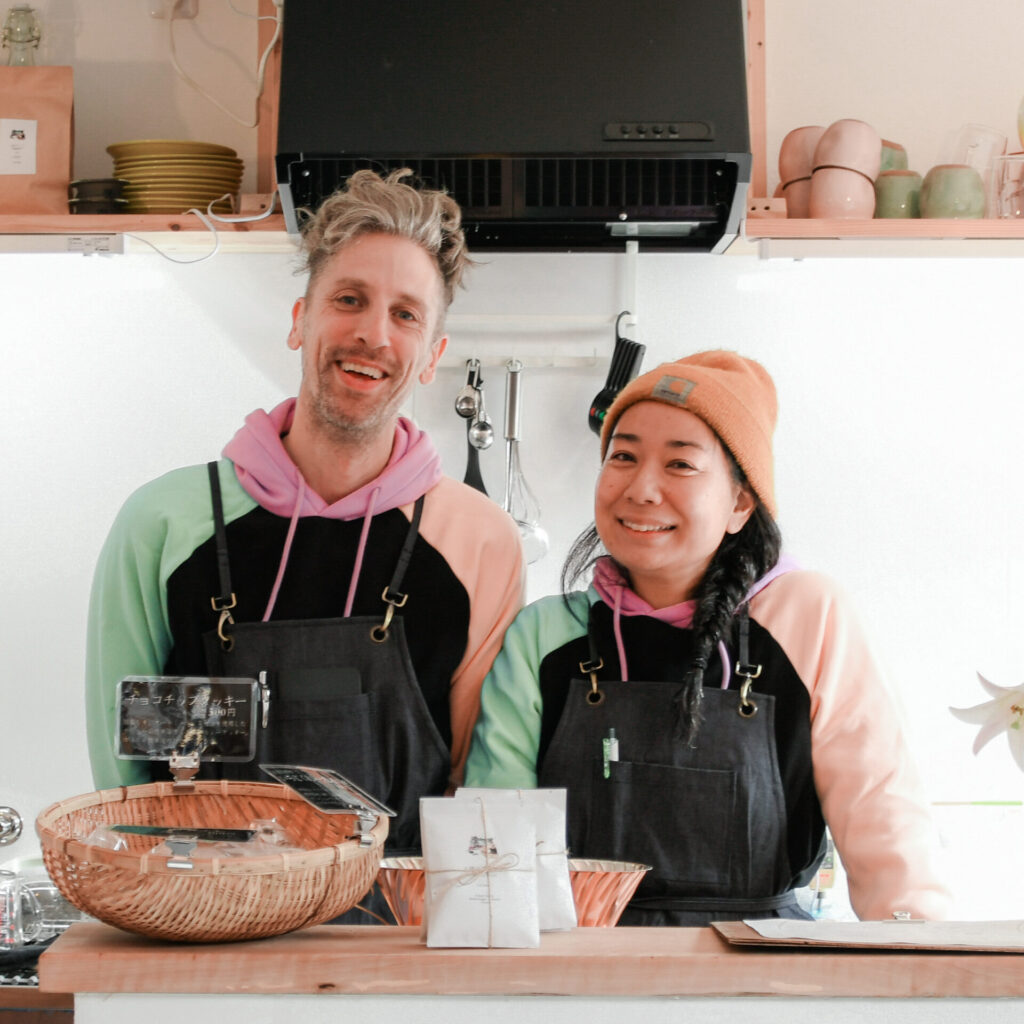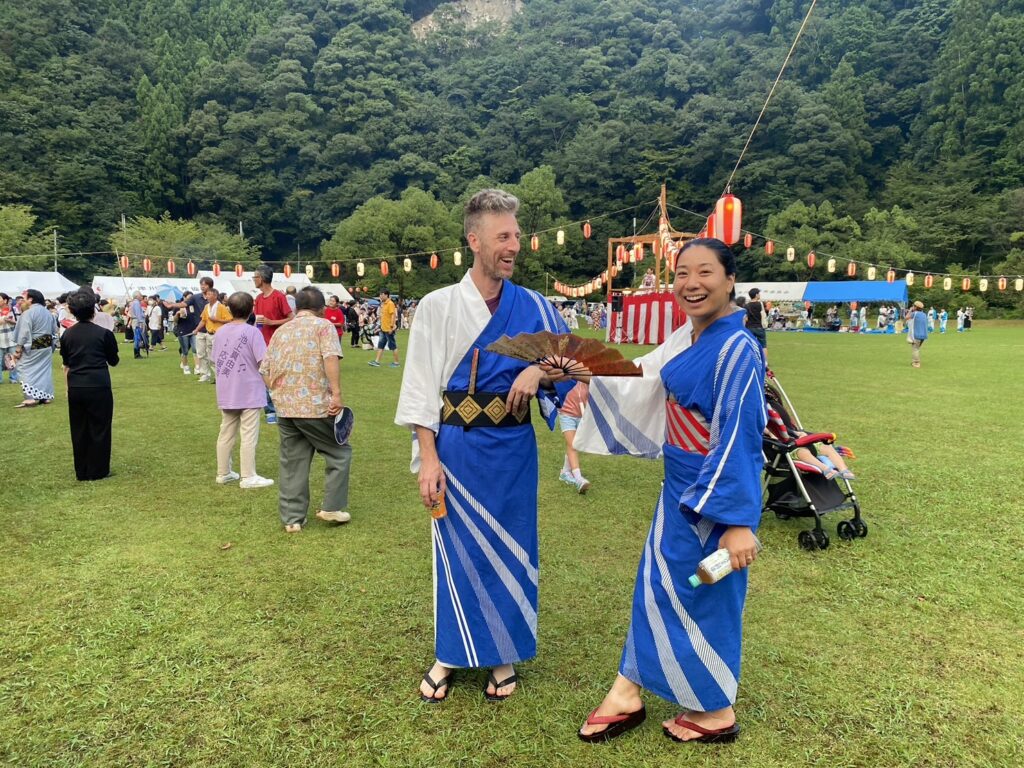
Connecting Totsukawa Village to the World: A Rich Life Surrounded by Nature

角田 華子
Hanako Kakuta
Totsukawa Village [Nara]
Kakuta Hanako, born in Sendai, Miyagi Prefecture, moved to Yokohama for university. After graduating, she worked in IT and researched female infertility before working at a tour company targeting foreign tourists. She became enamored with Totsukawa Village in Yoshino County, Nara, where she had stayed for a long time, and decided to move there. Currently, she works as a coffee-brewing taxi driver and guide, introducing the allure of Totsukawa Village to foreign tourists.
In the remote village of Totsukawa, blessed with numerous breathtaking natural landscapes, Kakuta Hanako lives as a guide, offering tours to foreign tourists. Enchanted by the people of Totsukawa Village, who have mastered the art of living amidst nature, Kakuta now aims to convey the stories and mindset of the locals through guided tours and experiential activities.
We interviewed Kakuta about what she feels is the charm of Totsukawa Village and what kind of future she envisions for this village.
Her title is a coffee-brewing taxi driver and guide

Located at the southern tip of Nara Prefecture, Totsukawa Village is Japan’s largest village by area, with around 2,800 residents living in 55 settlements. Surrounded by mountains, the village features attractions such as the 297-meter-long, 54-meter-high Tanize Suspension Bridge, the UNESCO World Heritage-registered pilgrim trails connecting Mount Koya and Kumano Sanzan, and the Tamaki Mountain Observatory. The observatory offers panoramic views of the village and the Hatenashi Mountain Range, showcasing the area’s majestic nature and historical sites across all four seasons.
“When I ask the villagers about their favorite seasons, most say spring and summer. My first stay in Totsukawa was from autumn to spring for six months. Then, I decided to experience spring and summer too, and extended my stay to live here throughout the year. Before I knew it, five years had passed,” says Kakuta Hanako, who moved to Totsukawa Village in 2019. Originally dispatched as a guide to introduce rural Japan to foreigners, Kakuta fell in love with the village’s nature, culture, and, most importantly, its people, prompting her decision to move. Her current title, “coffee-brewing taxi driver and guide,” comes from the café she runs with her Canadian husband, Tarek, which opened a few months ago.
Kakuta first visited the village while working for an inbound tour company in Kamakura.
“When I started at the company, I was responsible for operating a platform that matched foreign visitors to Japan with locals who wanted to guide them. However, it didn’t sit right with me that I was overseeing this without any guiding experience, so I started guiding myself. Before I knew it, I had become the most experienced guide in the company.”
At that time, a project to attract inbound tourists to Totsukawa Village was planned by the Nara Prefecture Tourism Foundation. The operation was managed by her company, and Kakuta, with her extensive guiding experience, was dispatched to the site.
“I had always wanted to guide foreigners around the Japanese countryside, so this was a perfect opportunity for me.”
Nurtured by nature from a young age
Kakuta’s current activities are greatly influenced by her childhood experiences. Born and raised in Sendai, Miyagi Prefecture, she followed her two older sisters into a well-known kindergarten that was enthusiastic about English education. Thanks to this, she became fluent in English and came to see foreigners as a part of her everyday life. She also studied abroad in the United States during high school, where she met friends from various cultures and religions. This experience led her to aspire to a career involving interaction with people across different countries.
“I was held by foreign teachers from the time I was in diapers, which naturally fostered a sense of diversity within me. Maybe that’s why I found the varied values of the friends I met during my study abroad genuinely interesting,” Kakuta recalls.
After graduating high school, she attended university in Yokohama and worked for several IT companies. She later visited the United States again, where she encountered biotechnology. This piqued her interest, and upon returning to Japan, she quit her job to re-enter university for a doctoral program, dedicating herself to research.
“I was involved in research for a quite long period. However, doing research alone often made me feel down. That’s when I was invited to join a tour company targeting foreign tourists. I had been part of a community interacting with foreign tourists visiting Japan, so I decided to make a drastic career change,” Kakuta explains.
Then, fate led her to Totsukawa Village. A few months after her stay began, she decided to extend her stay, but the project was interrupted by the COVID-19 pandemic. Although the company suggested she leave the village, leaving was not an option for Kakuta. Instead, she chose to live in the village as part of a regional revitalization team, recommended by the local government.
The skills and rich life of the people of Totsukawa Village

What is it about Totsukawa Village that so captivates Kakuta?
“The people here have a way of living with nature. They can grow vegetables, raise chickens for eggs, and even hunt deer and boar for food. Moreover, when there was a major flood, instead of waiting for government help, the villagers themselves used bulldozers to clear the mud-covered roads and worked together to overcome the situation. Everyone cooperates and fully utilizes their wisdom and skills to survive. I am absolutely fascinated by their way of life,” says Kakuta.
In this mountainous region, Kakuta was convinced there must be reasons to keep living on this land. That’s why she wanted to stay—to pursue these reasons.
“The first thing that surprised me when I arrived here was how close people are to each other. When I lived in an apartment in Yokohama, I only knew the name of the person next door. There was life and work, but it didn’t feel like ‘living.’ But in Totsukawa Village, I felt that people really lead a rich life.”
Living alone in the city means staying solitary unless one chooses to engage with the community. However, in Totsukawa Village, there is a role for everyone in the community, and fulfilling this role is seen as natural.
“It was comforting for me. I could feel like I was truly living, interacting with people, not just staying overnight. That’s why I respect the people of Totsukawa Village and try to emulate their approach to nature and culture,” Kakuta expresses.
On the other hand, the villagers also warmly welcomed Kakuta. As they passed each other on the street, they would greet her with a smile, saying, “Good to see you. It’s great that young people are working hard.”
Conveying the stories and mindset nurtured by the village
Now a full member of the village, Kakuta’s title, as mentioned earlier, is “coffee-brewing taxi driver and guide.” Along with her husband Tarek, she runs a café that serves as a hub for tourist interactions, and she works both as a taxi driver and a guide.
In 2021, the village office and a local taxi company started collaborating to operate a municipal taxi service. Currently, it serves not only tourists but also locals as a means of transportation. In Japan’s largest village, without a car, the only options for shopping or visiting a doctor were the few buses that run each day. The introduction of the municipal taxi has dramatically eased daily transportation, and Kakuta is involved as a driver. As a guide, she has started to connect with people she wouldn’t have met otherwise, becoming a familiar face to many.
And as a tour guide. From the outside, one might wonder if the relationship between the foreign tourists and the villagers is going smoothly. What does Kakuta think?
“I don’t feel any difficulty there. First of all, the generosity of the village people. Also, I think I’m good at connecting people. I organize experiential tours that link what the tourists are interested in with what the villagers excel at. For example, a lunchbox-making experience. Together with the village grandmothers, tourists can cook traditional ‘mehari sushi’ and side dishes using freshly harvested vegetables. During this process, conversations about the local nature and culture flourish. As a guide, I act as a bridge between the tourists and the locals, interpreting for them,” Kakuta explains.
What Kakuta values most is conveying the villagers’ mindset. When guiding tourists around local sights, she carefully traces the villagers’ feelings and involvement with the places. When she guides tourists to the ‘Tanize Suspension Bridge’ in her settlement, she shares the history of the bridge, initially built to improve living conditions but now used to attract tourists. She also hopes to pique their interest in the entire settlement by maintaining a walking path leading to an observatory.
“I believe there’s value in conveying the places and culture that have been cherished for decades, centuries, alongside the feelings of the people living here. It’s not just about the past or the present, but by blending the two, I think visitors can feel the mindset of the villagers,” Kakuta says.
“Here was the Japan I wanted to see,” say the foreigners guided by Kakuta. They experience the pristine landscapes and history of rural Japan in Totsukawa Village, meet the locals, and hear their stories, making them want to return, to stay longer next time.
In the future, Kakuta envisions making Totsukawa Village a gathering place for people from all over the world, where the diversity she has cultivated can further spread globally.
“One day, this could also contribute to the PR for Totsukawa Village and Nara Prefecture. Currently, 46% of the village population is over 65 years old. If we want to increase the number of migrants, I think it doesn’t have to be just Japanese. But for that, there need to be job opportunities for foreigners as well. First, as a model, my husband and I need to establish a livelihood here. If we can do that, it might also encourage young people who have left the village for education to return. They might see that they don’t need to go to the city to find work they are passionate about; we’re starting to demonstrate that,” Kakuta says.
There’s still much she wants to do. Considering a dual life between her husband’s homeland, Canada, and Totsukawa, and from there, attracting tourists to the village, Kakuta believes it’s essential to first enjoy living as part of the village.
What does she want to pass on to the future?

Finally, we asked Kakuta what she wants to pass on to the future.
“To create a village where children’s voices can be heard. By having foreigners spend time here, I want to achieve international exchange through tourism within the village,” she says.
“I feel sad in places where you can’t hear children’s voices. My ideal is to see children playing energetically and the village’s grandparents smiling happily. Having children means it’s a village where young people live. Culture and history are things that are passed on because the next generation exists. Plus, if foreigners join in, we can achieve international exchange within the village. In Totsukawa Village, nestled in the mountains of Nara, we continue the lifestyle that has been passed down through generations, regardless of age or nationality. What I’m trying to do may be a step toward making that a reality,” Kakuta reflects.
Throughout the interview with Kakuta, the word “borderless” kept coming to mind. Regardless of race, nationality, and generation by engaging with everyone and connecting them, unexpected chemical reactions occur. And enjoying and being surprised by these interactions more than anyone is Kakuta herself. After falling in love with the people of Totsukawa Village and moving there, I, too, found myself falling for Kakuta.
